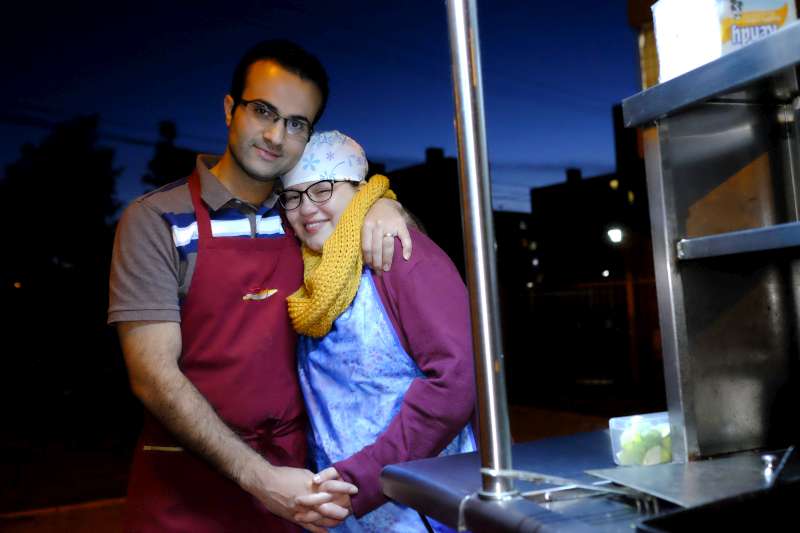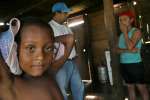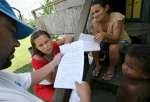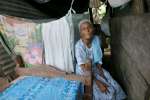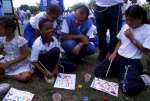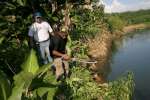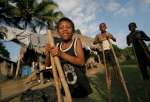- Text size
 |
|  |
|  |
| 
- عربي
Syrian refugee serves up a taste of home in Colombia
News Stories, 14 October 2015
BOGOTA, Colombia, Oct 14, (UNHCR) – Before fleeing the civil war in Syria, Almotaz was a student living with his family in Damascus. Now as he builds a new life in Colombia, he is serving up a taste of home to passers-by on the streets of a neighbourhood near Bogota, the capital.
Using recipes his mother dictates over the phone, he cooks up falafel, eggplant and lentil dishes for curious residents, winning them over one bite at a time.
"At the beginning people were looking at my food in a strange way, but once they tasted it they came more and more," says Almotaz, showing off his gleaming food cart.
"When I talk with my mum ¬- for no more than one hour per day as there's no electricity in Damascus – she gives me Arabic recipes and now they are very successful in this Latin American country!"
His new life near the Colombian capital followed a gruelling flight from danger. Just 22 and in his third year of university in the Syrian capital, he was called up for mandatory military service in 2013.
"I did not want to join the army as it meant killing my people, my family," he says. "So I did not have any other option except to escape as soon as possible."
His parents, who ran a large supermarket in the centre of Damascus, were prepared to pay for his passage to safety. But then a bomb blasted their store to pieces one morning. Undeterred, they sold the land and Almotaz fled to Turkey via Lebanon.
Their son became one of four million Syrian refugees. Most have sought safety in neighbouring Turkey, Lebanon and Jordan, although around 2,640 are seeking or have been granted asylum across Latin America. He left behind his parents, three brothers, friends, home and education.
"When I left Syria, I left all my dreams behind, but I did not see a way out," he says. "Militia fighters are everywhere in the streets, they stop you, they steal from you and break your identity card, they kill you. I lost friends because they refused to join the military," he added.
By 2014, Almotaz was living in a small room in Turkey with four other people. Although he managed to find some casual work, the rent was high and he was very poorly paid. "I could not live that way, I was losing my dignity as a man," he recalls.
Before the war broke out, he had lost his heart to a Colombian girl who was a good friend of the family, but who he had never met in person. They had talked a lot online over the years, and the pair decided to marry while he was still in Damascus.
"Just getting married was another nightmare," says Almotaz. "The institutions asked for lots of papers and money. My mum sold her last jewelry to pay the wedding papers and my future wife used all her university savings. But once married it was not so simple to ask for a visa for Colombia."
So in desperation, Almotaz linked up with a smuggling network and, thanks to the generosity of a Syrian friend, was able to book a plane ticket to Ecuador. Once there, he met his wife for the first time and together they crossed the border to Colombia, their final destination.
"I still remember that day, the 9th of August 2014," he says, smiling. "Once I arrived in Colombia, I asked for asylum and thanks to the intervention of UNHCR and the Colombian authorities I got refugee status after six months."
But it was not easy to rebuild his life in a far-away country, with a different language and no job. During the first few months in Bogota, he sold a rice pudding dish prepared by his wife in the streets. Then, little by little, he learned Spanish and started his own business making Arabic food.
Now with the help of UNHCR, Colombian authorities and his small business, Almotaz can just about cover rent, food and transport, although there is no money left for the couple to continue their studies. "I am happy, but I can't compare my current life to my past good life. Also, I really miss my little brother, sister and my parents who still live in danger in Damascus."
Almotaz is particularly worried about his brother who recently reached military service age. "My parents have run out of money," he says. "They sold everything they had to pay for me to leave Syria. There is no money left for my youngest brother… who is still in Damascus … and is afraid of being forced to join the army."
Almotaz's dream is to bring his relatives to Colombia where they can live in safety. And soon, they will have a new addition to the family – in five months, Almotaz will become a father. "I am really grateful to UNHCR and the Colombian government. My life now is here, despite the integration difficulties I am still facing but it is impossible to come back as the war In my country will never end."
Francesca Fontanini, Bogota, Colombia
